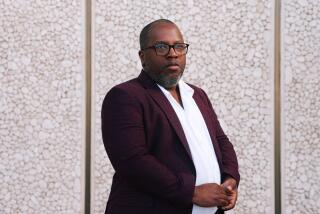JACKSON SEES REAL VICTIMS WHEN COPTER GETS LOST
ADDIS ABABA — In his final day in Ethiopia, Marlon Jackson was entertained the way a visiting dignitary should be:
--by a spear-toting break-dancer, complete with a mini-harem of singing orphans;
--by a rock combo, performing “Oh! Susannah” to a reggae beat;
--by several hundred well-behaved, well-nourished children who danced, sang and clapped on command at the government’s Zerai-Deres village for Ethiopian waifs.
Jackson, the 28-year-old brother of Michael, was touched. He has three children of his own, and at times his eyes welled up with emotion for the 3,700 children of Zerai-Deres whom he visited on Saturday.
But he was not fooled.
“When I first came here, I had one direction of thinking: People are hungry; let’s feed them,” he told The Times.
“But when you get here and you listen and you look, you see there’s a lot more happening than that. I don’t like to get into that political stuff, but there’s a lot of politics going on here.
“And the people come second.”
The turning point for Jackson--as well as for many of the rest of the USA for Africa delegation here this week on a fact-finding tour of East Africa--came Friday when a helicopter on a trip to a model government relief camp landed at the wrong site.
Instead of seeing a government-orchestrated food delivery as well rehearsed as the Zerai-Deres orphans chorus, Jackson and the others--including two USA for Africa doctors--saw what is known in the southern highlands of this drought-plagued country as the “green hunger.”
“We weren’t supposed to be there, I don’t think,” Jackson said. “The pilot got lost, so we just landed. And all these little kids were peeking through the bushes. It was like a movie.
“Within three minutes, it was a sea of people holding out their hands and saying, ‘Hungry, hungry.’ ”
For virtually the first time in four years, rain has begun to fall in the northern provinces of Ethiopia, a country of 42 million with about three times the area of California. In the south, Addis Ababa gets a few millimeters annually. But the scant rain that greens the hillsides isn’t enough to produce immediate crops and the village people continue to go hungry, especially in remote mountain plateaus where grain shipments must be flown in and dropped. The fields appear fertile, but they are not.
Hence, green hunger.
“There were about 300 people there, I’d guess,” said Dr. Irwin Redliner, a New York pediatrician with the USA for Africa medical task force. “Every one of them should have been hospitalized immediately. Nasal discharges, distended bellies--this was a whole army of malnourished, sick kids.”
But it is doubtful that any of them will see the inside of a hospital, nor much in the way of regular relief supplies.
What the Harry Belafonte-led group of entertainment veterans learned this week is that positive first impressions in Africa are often illusory. Tribalism translated into civil war and the military’s open lust for absolute power and for new armaments run too deep to be set wholly and unselfishly aside for such humanitarian efforts as attempting to feed one-sixth of Ethiopia’s population.
“I think the government just tried to show us the good side,” Jackson said. “They just wanted us to see what they wanted us to see.”
Publicly, Jackson signed autographs as a tolerant surrogate for his younger brother and graciously followed the Ethiopian itinerary set down for him and the other USA for Africa representatives by the Marxist government’s Relief and Rehabilitation Commission: an arts and culture show; a model orphanage; a port tour at the Red Sea docks of Assad, where most of the Western grain aid arrives by ship.
Privately, Jackson was angry.
“Here they are asking the United States, asking Russia, asking all these countries to help them, and what are they doing with it all? They sure aren’t helping the people. I think they’re just using us and all the other countries,” he said.
Visits to two of the worst refugee camps, Ibnet and Bati, where thousands more village refugees pour in every week, were canceled without explanation by the Relief and Rehabilitation Commission. Instead, the USA for Africa delegation was steered to Makale, considered a model camp, which the government uses to show foreigners how well it is handling the drought-induced famine that took more than 300,000 lives last year.
Absent from Makale and many of the other sites that USA for Africa visited were young men, Jackson noted.
“I mean, every guy I saw was 60 years old! Somebody told me they were shipping all the younger ones off to the military. That way, they can’t cause any problems.”
Ethiopia’s standing army is one of the largest of any Third World country, even though its gross national product is one of the lowest. Its soldiers are fighting in the rebellious provinces of Tigre and Eritrea to the north and battling neighboring Somalia to the south.
But it remains one of the poorest countries on earth.
“It’s political and it’s a power struggle, that’s what it is, and it’s a damn shame the government has to do something like this in playing with people’s lives,” Jackson said.
Though USA for Africa’s fact-finding mission is only half over, Jackson is going home this week instead of continuing on with Belafonte and the others to the Sudan--another drought-plagued nation north of Ethiopia.
But, he said, he will take his anger with him when he leaves.
“I really do feel sorry for the children, you know? I really do, because they have no future. They don’t have any toys. They do need food, yes, but they need something to play with too--you know, like toys we throw away. You know what I’m saying?”
He paused and swallowed hard, shaking his head slowly from side to side.
“They have nothing,” he said with a breaking voice. “They have nothing at all. Nothing at all.”
More to Read
Only good movies
Get the Indie Focus newsletter, Mark Olsen's weekly guide to the world of cinema.
You may occasionally receive promotional content from the Los Angeles Times.










